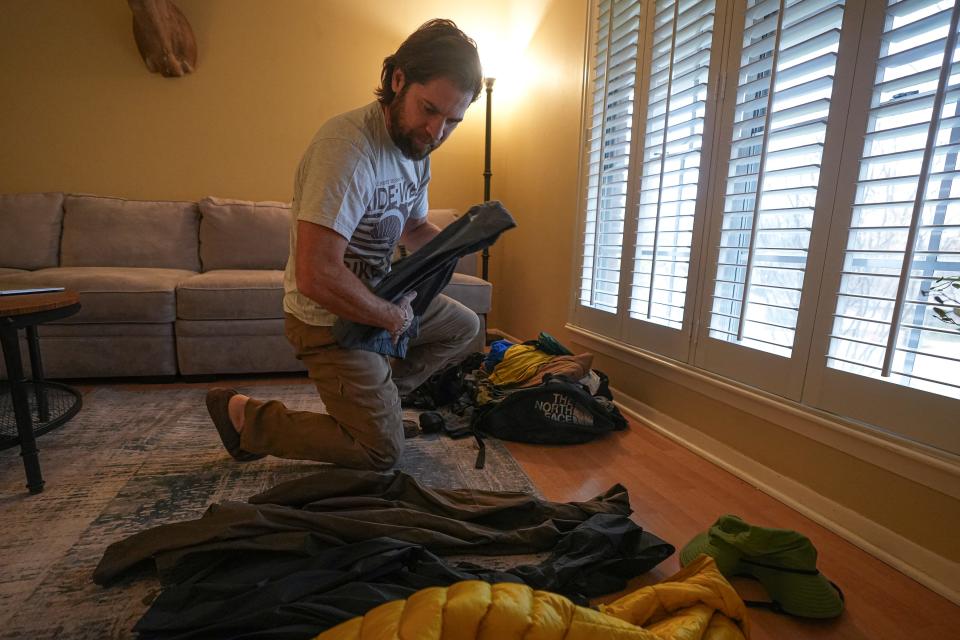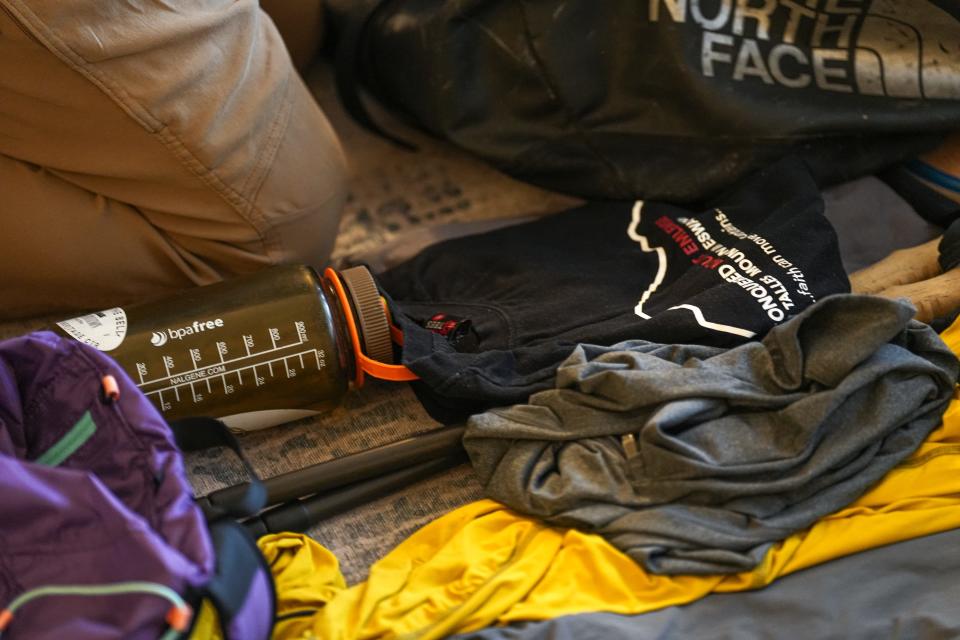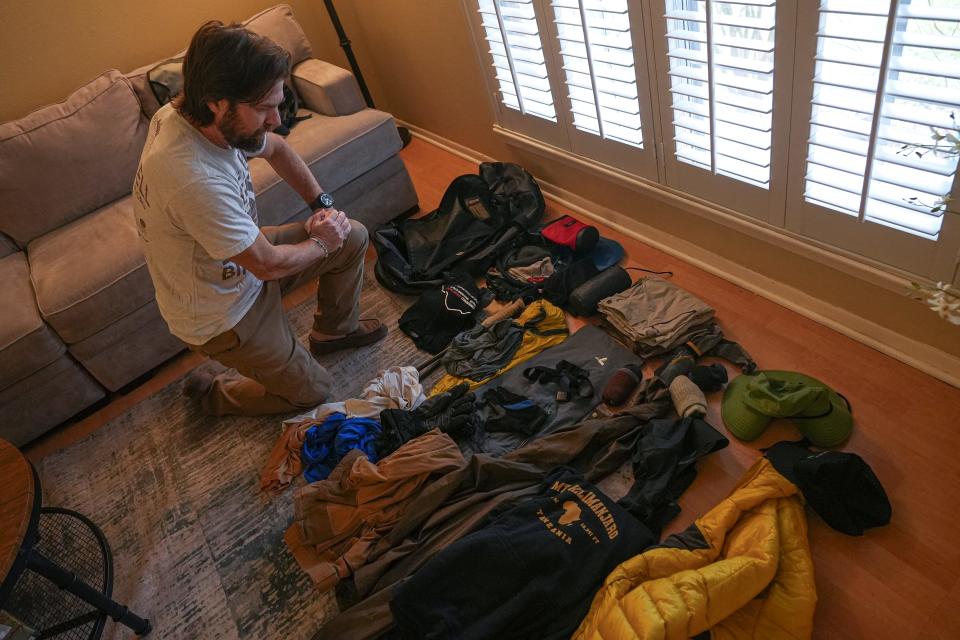Southwestern University students to get life-changing experience on Mount Kilimanjaro hike
Branndon Bargo is taking 12 Southwestern University students to hike the highest peak in Africa at the beginning of January. Mount Kilimanjaro, a snow-capped volcano in Tanzania, stands 19,340 feet tall. It is also the world's highest free-standing mountain.
Bargo, the 47-year-old assistant director of outdoor adventure for Southwestern, said that as far as he knows, no other universities sponsor trips to the African mountain that Ernest Hemingway famously wrote about in 1936 in "The Snows of Kilimanjaro." The trip also will be educational for the students, who will go on a safari and visit an orphanage.

Southwestern University is a private institution in Georgetown affiliated with the United Methodist Church. It ranked No. 1 among Texas private schools for making an impact, according to the Princeton Review's yearly college rankings.
Bargo said there are good reasons for the students to climb Kilimanjaro. He's familiar with the route, a 40- to 45-mile round trip, because he has already led groups up the mountain three times, he said. During one of those climbs, he guided an amputee who had lost his leg below the knee.
"This will be my fittest group because they are all young," Bargo said of the Southwestern students.
More: College application deadlines are approaching. Here's what to know for Austin-area schools
He has climbed mountains in more than 60 countries, but Kilimanjaro might be his favorite, he said, because of the five different ecosystems along the route. Hikers start in an area with coffee plantations and walk through a rainforest with monkeys, a moorland with grasses and heathers, a desert zone, and then an arctic zone with glaciers. Temperatures will range from the 70s at the bottom of the mountain to possible subzeros at the summit, Bargo said.

He said the students will be hiking Kilimanjaro, which lies near the equator, during the nonrainy season. The group was set to leave on New Year's Eve and return Jan. 13.
More: With gifts, millionaire Jack Garey helped transform Georgetown, Southwestern University
Each student will pay $500 for the trip. Southwestern will cover the rest of the cost, which is $5,000 per student, Bargo said.
Technical equipment such as ice axes or ropes for rock climbing is not required for the eight-day hike on the mountain, he said.
The safari and orphanage visit will be after the hike.
The students also will see a level of poverty they don't see in the United States, he said. The porters who carry equipment for climbers often wear flip-flops and dress in short sleeves because they can't afford anything else. Many residents in the area live without electricity and have to carry water for miles, Bargo said.
"I want students to see those things and not feel overwhelmed but think, 'Wow, what can I learn from this?’ ” he said.
Eighty-two students initially applied for the trip. University staffers whittled the number down in different ways, including asking the students why they wanted to go, said Cindy Cisneros, the university's coordinator of outdoor adventure, who is going on the hike.
"If someone wanted to check it off their bucket list they were probably not a good candidate because we will not just be climbing the mountain. We are experiencing the culture," Cisneros said. "We had to make sure they could handle themselves in a new environment and a new culture with people they may not know."
She said some university trustees wanted to go on the trip but couldn't because of conflicts.
Jillian Clack, a 20-year-old biology major, is making the trek. She said she spent the summer backpacking in New Mexico and Colorado to prepare.
"We attend a private university where we experience a lot of privilege, and the opportunity to go and widen my worldview is something that definitely appeals to me," she said. "This will easily be the most challenging thing I have ever done, and it will push me to limits I have never reached."
She said she is bringing a pair of tennis shoes and a couple of long-sleeved thermal shirts to give to the porters.

The students will carry 5 to 10 pounds of extra layers of clothes, water and snacks, with the rest being carried by 20 porters who also will do the cooking, Bargo said.
Thira Schlegel, a 23-year-old senior majoring in painting and drawing with a minor in environmental studies, said she has been getting in shape by running in trail races at night, including some that are more than 18 miles long.
She will carry an easel and watercolors on the hike to paint some scenes from the mountain. She also will also bring a pair of running shoes for a porter.
"I don't have a lot of experience with elevation. The highest I've been is about 10,000 feet on a trip to New Mexico where all I carried was water," Schlegel said.
Keanan Ngo, a 22-year-old business major, said he's bringing stuffed toys to give to the children the group will visit at the orphanage. He's a football player for Southwestern so he's stayed in shape, he said. He is also practicing yoga and meditation to help with his breathing on the mountain.
"I wanted to challenge myself because I've been to Asia and Europe but never to Africa, said Ngo, who is Vietnamese.
Bargo said that the porters won't carry any oxygen but that the group will hike slowly enough to acclimate. It will take eight days, with the group traveling 4 to 5 miles each day in about five hours, except for the last segment before the hikers reach the summit.
To get to the top, the group will have to start hiking at midnight and walk eight hours, Bargo said. After the hikers reach the top they will spend about 20 minutes there and then head back down, walking for about three to four more hours.
Southwestern University President Laura Trombley said her recent recovery from a hip replacement has prevented her from going on the trek. A generous donation from one trustee and donations from other trustees have made the outdoor program, including the African hike, possible, Trombley said. She said the trip to Kilimanjaro gives students the experience of "going into nature, realizing how much it gives you and how we need to protect that."
"It's a life-changer, and I think they will never forget this. They will always appreciate what the university has managed to support them to do and want to give back and make sure other students have the same type of experience."
This article originally appeared on Austin American-Statesman: Southwestern University students to hike Mount Kilimanjaro in new year

